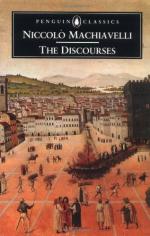
|
| Name: _________________________ | Period: ___________________ |
This test consists of 5 multiple choice questions, 5 short answer questions, and 10 short essay questions.
Multiple Choice Questions
1. What did Machiavelli report led gatherings of people to make laws?
(a) To protect economic activity that benefited the city.
(b) So resources could be justly distributed.
(c) To avoid evils that people committed on others.
(d) To set order to the defense of the city.
2. What, according to Machiavelli in Book , 1 Section 38, is the fate of irresolute Republics?
(a) They have no alternative but to join alliances with powerful Republics that will take control of them.
(b) They face invasion, destruction and anhilation.
(c) They will eventually fade away and reemerge as a tyranny.
(d) They cannot settle conflicts except with force because their weakness prevents them from resolving doubts over issues.
3. What is the branch of government that Machiavelli recognizes as that which most prevents or causes corruption to come over a city?
(a) The judicial (magistrates) branch.
(b) The princes.
(c) The plebeian branch.
(d) The legislative branch.
4. Why does Machiavelli suggest wars should be quick with limited damage to the conquered City?
(a) So armies can be brought home to participate in a productive economy.
(b) So armies can be readied for the next war.
(c) So Citizens are not burdened by the demands of the war.
(d) To reduce the cost to the conquering Prince and preserve the resources of the conquered city as booty for the conquering forces.
5. What are reasons Machiavelli cited for a group of people leaving their native country to seek a new home?
(a) Overcrowding and social unrest.
(b) Pestilence, famine or war.
(c) Racial conflict and economic injustice.
(d) Family strife and lack of work.
Short Answer Questions
1. What was an example from Roman history that Machiavelli used to suggest the Plebes possesses greater wisdom than Nobles?
2. How does Machiavelli expect a city can keep its freedom after a weak Prince follows an excellent Prince?
3. How does Machiavelli recommend a Republic deal with enemies that spring up within an empire?
4. According to Machiavelli, how did the Agrarian Laws violate the foundation of well-ordered Republics?
5. What does Machiavelli identify as the easiest way to "...ruin a Republic where the People have authority...."
Short Essay Questions
1. Why does Machiavelli believe that people who break away from the rule of a Prince have difficulty keeping their freedom?
2. What does Machiavelli claim proves the Romans' love for liberty?
3. How does Machiavelli explain that a City grows either through love or through force?
4. Why did Machiavelli consider the naming of a Caesar (dictator) over Rome was beneficial to the Empire?
5. Why does Machiavelli report that the Roman Senate decided to pay a public stipend to the soldiers in the army?
6. What two methods did Machiavelli identify that Roman Nobility drew honor from the Plebes?
7. What are the reasons that Machiavelli gives for people who leave their home country for another out of necessity?
8. Why does Machiavelli disagree with Plutarch's claim that Rome acquired its Empire more by good Fortune than by Virtu?
9. What does Machiavelli recommend to a Prince about reform of a city or a province that he has taken?
10. Why does Machiavelli challenge Cities to punish citizens with respected reputations when they commit wrong acts?
|
This section contains 1,158 words (approx. 4 pages at 300 words per page) |

|




